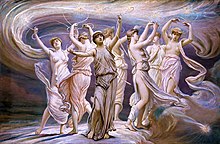In Greek mythology, Sterope (/ˈstɛrəpiː/; Ancient Greek: Στερόπη, [sterópɛː], from στεροπή, steropē, lightning),[1] also called Asterope (Ἀστερόπη), was one of the seven Pleiades.[2]
| Alcyone | |
|---|---|
| Member of the Pleiades | |
 The Pleiades by Elihu Vedder | |
| Other names | Asterope |
| Abode | Mt. Cyllene on Arcadia, later Pisa in Elis |
| Genealogy | |
| Parents | Atlas and Pleione or Aethra |
| Siblings |
(b) Hyades
|
| Consort | (i) Ares (ii) Oenomaus |
| Children | (i) Oenomaus and Evenus (ii) Hippodamia |

Biography
editAsterope was the daughter of Atlas and Pleione, born to them at Mount Cyllene in Arcadia. She was the wife of King Oenomaus of Pisa, or according to some accounts, his mother by Ares[3] or Hyperochus.[3] Sterope was also credited to be the mother of Evenus (father of Marpessa) by the said Olympian god.[4]
Other Use
edit- USS Sterope (AK-96) was a United States Navy Crater class cargo ship named after the star.
- Asterope is a name of the double star 21 Tauri and 22 Tauri in the Pleiades cluster of stars.
- 233 Asterope is a T-type main belt asteroid
Notes
edit- ^ Liddell, Henry George; Scott, Robert. "sterope". A Greek-English Lexicon. Perseus Project, Tufts University. Retrieved December 13, 2012.
- ^ Pausanias, 5.10.5
- ^ a b Apollodorus, 3.10.1
- ^ Plutarch, Parallela minora 40
References
edit- Lucius Mestrius Plutarchus, Moralia with an English Translation by Frank Cole Babbitt. Cambridge, MA. Harvard University Press. London. William Heinemann Ltd. 1936. Online version at the Perseus Digital Library. Greek text available from the same website.
- Pausanias, Description of Greece with an English Translation by W.H.S. Jones, Litt.D., and H.A. Ormerod, M.A., in 4 Volumes. Cambridge, MA, Harvard University Press; London, William Heinemann Ltd. 1918. Online version at the Perseus Digital Library
- Pausanias, Graeciae Descriptio. 3 vols. Leipzig, Teubner. 1903. Greek text available at the Perseus Digital Library.
- Apollodorus, Apollodorus, The Library, with an English Translation by Sir James George Frazer, F.B.A., F.R.S. in 2 Volumes. Cambridge, Massachusetts, Harvard University Press; London, William Heinemann Ltd. 1921. ISBN 0-674-99135-4. Online version at the Perseus Digital Library.